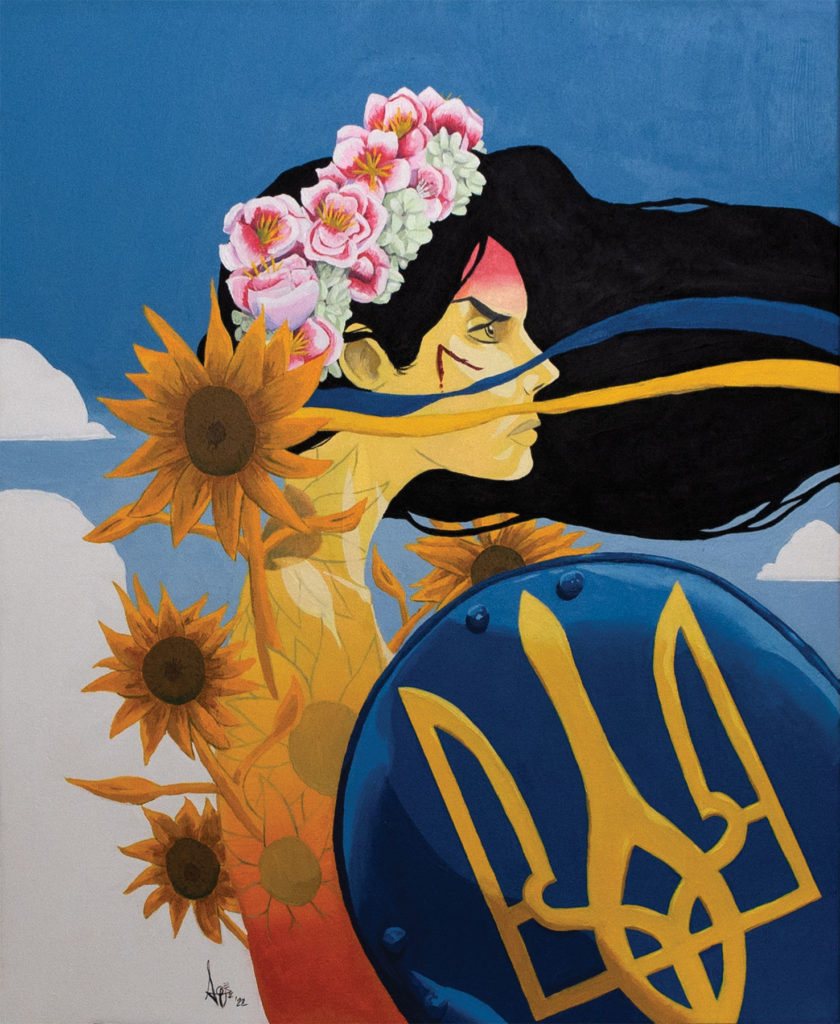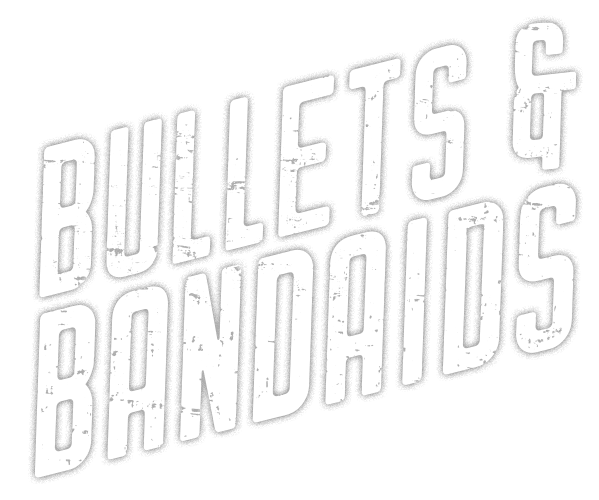
Sammy Lopez
24″ x 36″ • Acrylics on canvas
Artist Statement
With the war in Ukraine still ongoing, Ana Sazonov’s personal story is a reminder to keep attention and focus to the tragedies and injustices that this war has brought unto the Ukranian people. Ana’s personal connection as a Ukranian herself, and her efforts to support her people through ongoing discussions on this war, draws a comparison to the resiliency and hope the of citizens are currently enduring throughout this tragedy. As time passes, the world’s attention and support may wane from the height of the onset of the war, but as in any war, this conflict is very real and ongoing for the people living in the country and Ana continues to shine light on that in her story.
This war has brought attention to the strength, faith, firmness and capacity of the Ukranian people. While I am new to the Ukrainian culture and history, their palpable strength and defiance in the face of an oppressor is what I wanted to display in my work. Paralleled with with Ana’s personal journey, I wanted my work to be an abstract but very real symbol and depiction of standing firm against an enemy and the injustices of any war.
Instagram:@sammyivanlopez
by Susan Lenz
“Keep Ukraine in your mind, your heart, and in your actions.”
It’s said with hopeful enthusiasm, but underneath it, there’s anger. Frustration. Pain… and a profound Hope.
I was born on December 16, 1987, in a small town west of Kyiv in Ukraine, a place within ninety miles of the Chernobyl Power Plant. I grew up with radiation detectors needed for vegetables from the garden. I didn’t grow up, however, knowing that my original family name was Liebermann and that we were Jews.
With the collapse of the Soviet Union, the majority of Ukrainian Jews emigrated elsewhere; mainly to the United States and Israel. Six years old, I was among them. I had to adapt to Israel’s hot climate, to a new language, and to the revelation of my family’s faith. I finished high school and started my mandatory two years service in the Israeli Defense Forces. Later, I would describe this rite of passage, this move from not knowing my heritage to embracing it as though I was going from “hiding” to providing”.
I thought my options for military service were limited, due to my ADHD and the fact that I hold two passports. At first, I worried that I wouldn’t find a fulfilling job but shortly after becoming a basic training commander, I knew that the right job found me. I had a way to motivate soldiers who really weren’t interested in the tasks at hand. My displacement from Ukraine and other troubling life experiences were easily translated into a sympathetic ear. I listened but could answer, “We’ve all been through shit. If I can do it; you can too!”
The military taught me how to adjust to change, to train by example, and to quickly find viable solutions to any sort of unexpected problem. I learned to be a strong, confident, but personable leader. I learned that without risk there is no reward.
After finishing my military commitment, I took off for surfing, sunshine, and days wearing flip flops on Central America’s sandy beaches. I watched glorious, purple sunsets in Costa Rica before returning to Israel.
Restless, I traveled to Brazil and back again, finally diving into, and finishing, the business and economics undergraduate program at Ruppin Academy Center north of Tel Aviv. This led to three years into the business world. Restless again, I asked myself hard, spiritual questions: Was this life bringing about a better world?
Am I doing anything truly meaningful? My answer to each was “no.”
Risk was needed; I quit my job.
I joined the Jewish Agency for Israel, the same organization that had helped me emigrate there. As an Israel Fellow to Emory Hillel in Atlanta, Georgia, I finally felt fulfillment. I loved teamwork with the staff and especially assisting with Jewish student life. From there I moved to Boston, focusing my attention on the non-profit sector, earning my masters degrees in Jewish Leadership and an MBA in Nonprofit Management at Brandeis University. Afterward, I moved to Columbia as the Executive Director of the Columbia Jewish Federation.
Then things changed.
On February 24, 2022, Russia invaded my homeland. Bombs rained down. People died. Ukrainian President Volodymyr Zelensky took to social media to document the destruction and horror. Soon, one third of the population was displaced as more than eight million fled the country. But this was more than just a tragedy. It was a calling. I had to do my part.
Ukrainian and Russian speakers were needed at the border into Poland to assist those fleeing the war. I answered the call. Wearing a traditional Vinok, a headdress of flowers and blue and yellow ribbons, I welcomed weary travelers in their own language, even a woman bringing seven cats and a dog. Those coming had very little, including one couple in their eighties who had never been outside Ukraine. They couldn’t imagine what would happen next. When I asked, they simply wanted to “go home.” But home wasn’t safe. In some cases, home might no longer exist. More missiles drop daily. The list of atrocities and war crimes against innocent Ukrainian civilians gets longer every day. The end isn’t in sight.
At the border, I worked tirelessly for two weeks before returning to safety. If it hadn’t been for my responsibility, I would have stayed. Staying seemed to be suggested in the Talmud: “He who saves a single life, saves the world entire.” I strive to live by these wise words but also there’s another maxim: “It is not your responsibility to finish the work of perfecting the world, but neither are you free to desist from it.” I know that I started important work that will require years before recovery. The war wages on. People are still suffering.
The journey for democracy and freedom will be a long and painful one. I also know that my best efforts to support Ukraine are spent here in the United States by using my talents as a leader and motivator.
I am affecting change by adding my own personal experiences to those around meand bringing them together to raise awareness for the ongoing war. Once, one of my lectures touched a young American who later went to the Ukrainian embassy and joined the Foreign Legion. Without speaking any other language beyond English, he went to the front lines of Ukraine. I keep tabs on him as best as I can. More importantly, I’m aware that the world’s attention to this war is waning. It is my job to keep people informed, to continue the support. Because there’s a special type of tragedy when the war for the freedom of a democratic country becomes passé.
When Russia invaded Ukraine, blue and yellow flags were raised across the United States. People all over the world showed their support in a thousand ways. Organizations sent relief. Celebrity influencers tweeted. Just long enough to feel like they were on the cusp of world events before finding another shiny object. Like many early efforts, urgency for support has fallen drastically. The war isn’t the leading headline on all news outlets.
Attention has drifted elsewhere. War is tiring and yet the need for support is more dire than ever before. For me, my best effort is continuing to raise awareness.
I see this conflict as being one fought for freedom and democracy against the tyranny of an autocracy. I share videos and images of destruction, of hope, of freedom fighters driven to the brink and prepared to go farther. They illustrate the human need for a smile, a reassuring voice, and a united effort to repair the world. Sometimes I’m in those photos.
In the Jewish teachings, Tikkun Olam is any activity that repairs the world. It is the awareness that what the Great Creator made was innately good but that the world was purposely left with room for improvement. It is our job to start this important work even if it means taking a risk. It underscores not just the necessity, but the responsibility each of us has to one another. When I fight for Ukraine, I’m fighting for all of us.
When I say “Keep Ukraine in your mind, your heart, and in your actions,” there’s still anger. Frustration. Pain.
But there’s also profound hope.
